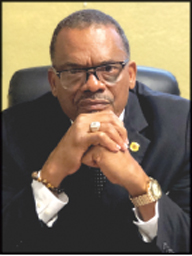A Message From The Publisher
So be strong and courageous, all you who put your hope in the LORD! Psalm 31:34
By Bobby R. Henry, Sr.
In the current political climate where Vice President Kamala Harris faces off against former President Donald Trump, the stakes are high and the tension palpable. As we navigate through this turbulent period in history, it is perhaps fitting to reflect on the purpose of the Olympics as a backdrop to this intense political rivalry.
The Olympics, with its long history of fostering unity and friendly competition among nations, serves as a beacon of hope and inspiration in times of division and discord. At its core, the Olympics symbolize a celebration of humanity’s diversity, resilience, and unwavering spirit in the face of adversity.
In the spirit of the Olympics, we are reminded of the values of fair play, sportsmanship, and respect for one another. These values should not be lost in the midst of the heated political confrontations that often dominate our discourse. Instead, let us strive to emulate the camaraderie and mutual respect demonstrated by athletes competing on the world stage. “In the spirit of the Olympics” in the political arena could meanmean conducting political activities or engagements with a focus on fairness, cooperation, unity, and mutual respect. It suggests approaching political interactions with a commitment to healthy competition, constructive dialogue, and ethical conduct, much like athletes competing in the Olympics strive for excellence while upholding the values of sportsmanship and fair play. In the political context, being “in the spirit of the Olympics” could imply striving for diplomacy, inclusivity, and peaceful resolutions while acknowledging and celebrating the diversity of perspectives and ideas.
While the Olympics are known for promoting sportsmanship and fair competition, there have been instances where human negativity creeped in. For instance the act of terrorism was a stark contrast to the spirit of sportsmanship. In Munich, Germany 1972, the Summer Olympics were marred by the tragic Munich massacre where Palestinian terrorists took Israeli athletes hostage, resulting in the death of 11 Israeli team members.
At Salt Lake City in the Winter 2002 Olympics, the figure skating scandal of a biased judging decision favored a Russian pair over a Canadian pair, leading to widespread criticism and calls for reform in the sport.
Human nature of wanting to be the best at any price cost Canadian sprinter Ben Johnson to be disqualified and stripped of his gold medal in the 100m race during the Seoul 1988 Summer Olympics after testing positive for performance-enhancing drugs, highlighting the issue of doping in sports.
These instances serve as reminders that in politics and even in prestigious international events like the Olympics, there can be moments of bad sportsmanship, controversial behavior and ethical breaches that go against the spirit of fair play, respect, and integrity which should govern these activities.
As we witness the Harris versus Trump political showdown unfold, let us remember that at the end of the day, we are all part of the same global community, bound together by our common humanity. Just as athletes from different countries come together to compete in the spirit of friendly rivalry, so too should our political leaders seek common ground and bridge the divide for the greater good of society.
The Olympics teach us that while competition is inevitable, it is how we conduct ourselves in the face of challenges that truly defines our character. Let us rise above the partisan bickering and divisive rhetoric, and instead embrace the values of inclusivity, collaboration, and mutual understanding.
In this pivotal moment in history, perhaps we can look to the Olympics as a guiding light, inspiring us to transcend our differences and work towards a better, more harmonious future for all. By embracing the spirit of the Olympics in our political discourse, we can begin to heal the wounds of division and build a more united and inclusive society for generations to come.
